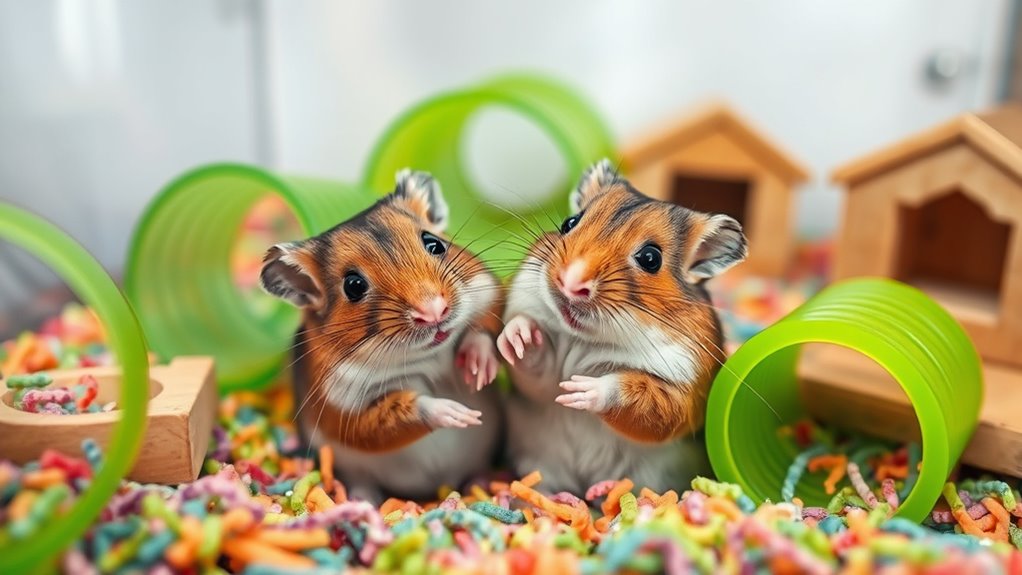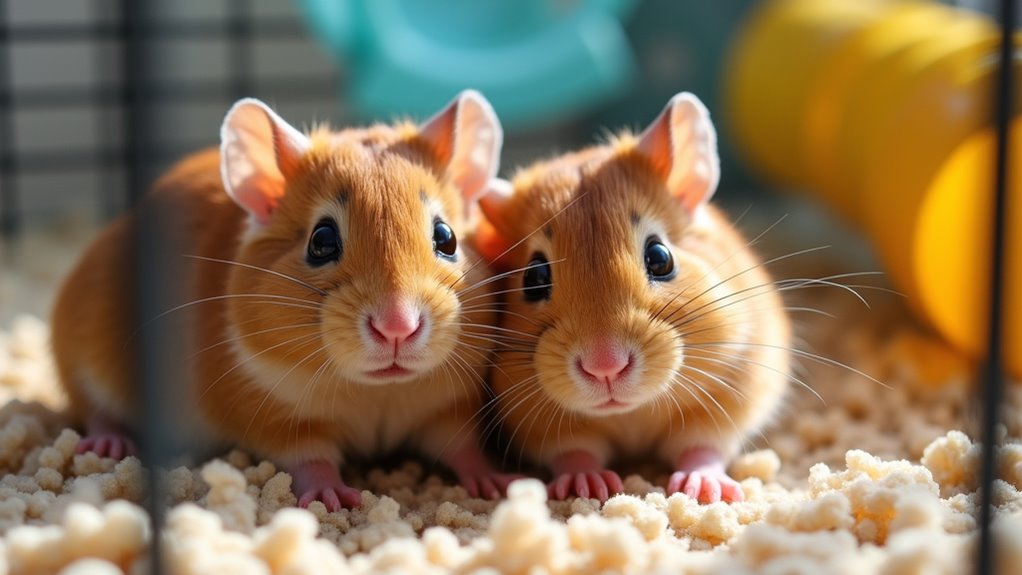Gerbils are social animals that do much better in pairs or groups, as they naturally thrive with companionship. Keeping a single gerbil can lead to loneliness, boredom, and stress, which may affect their health. Bonded gerbils groom, play, and communicate, supporting their well-being. If you want to know how to properly care for gerbils and ensure their happiness, there’s more you should contemplate.
Key Takeaways
- Gerbils are highly social animals that thrive best when kept in pairs or groups.
- Solitary gerbils can experience boredom, stress, and health issues due to loneliness.
- Properly introduced pairs develop strong bonds, share natural behaviors, and promote mental well-being.
- Unsocialized or incompatible pairings may lead to fighting; careful introduction is essential.
- When alone, gerbils need extra enrichment and interaction to help reduce loneliness and support their natural instincts.

Gerbils are highly social animals that thrive when they have companionship. If you’re considering getting a gerbil, it’s essential to understand that they don’t do well in solitary confinement. These little creatures form deep bonds through gerbil bonding, and keeping them alone can lead to loneliness, stress, and even health issues. When you provide a pair or a small group, you’re allowing your gerbils to engage in natural behaviors like grooming, playing, and communicating, which keeps them happy and mentally stimulated.
Gerbils thrive with companionship, engaging in natural behaviors that keep them happy and healthy.
If you’re tempted to keep just one gerbil, think about the consequences. While some owners believe a single gerbil might be easier to care for, many overlook the emotional toll loneliness takes on these social animals. Without a companion, a gerbil can become bored or anxious, often leading to destructive behavior or lethargy. Gerbil bonding occurs mostly through interaction and shared activities, and this process is crucial for their well-being. When you introduce your gerbils properly, they quickly establish a social hierarchy and develop strong bonds, making them happier and healthier.
Keeping two gerbils together is usually straightforward, but you should always ensure they’re introduced carefully to prevent fighting. When they bond well, they’ll share a nest, groom each other, and play together, which strengthens their connection. This social interaction isn’t just cute; it’s necessary for their mental and emotional health. If you notice signs of aggression or bullying, it might mean they need a different pairing or that they’re not compatible. But generally, gerbils prefer company and will look out for each other, reducing stress and providing constant companionship.
On the other hand, if you’re unable to care for more than one gerbil, consider providing extra enrichment and attention to keep their environment stimulating. Toys, tunnels, and regular interaction can help alleviate some of the loneliness, but they won’t fully replace the companionship of a fellow gerbil. Remember, gerbils are naturally herd animals, and denying them social contact can have serious implications. It’s your responsibility to ensure they have the opportunity to engage in gerbil bonding, which is fundamental to their happiness. Providing social interaction is essential for their mental and emotional well-being, and neglecting this need can lead to health issues. Proper socialization and gerbil bonding are crucial for preventing loneliness and promoting a healthy, fulfilling life for your gerbils. Additionally, understanding their social needs can help you create a more enriching environment that supports their natural instincts. Creating an environment that encourages natural behaviors and allows for appropriate socialization further enhances their quality of life.
Frequently Asked Questions
Can Gerbils Prefer to Live Alone Despite Being Social Animals?
You might wonder if gerbils prefer to live alone despite being social animals. While they do have some gerbil independence, they generally thrive with a companion. Solitary behavior can sometimes be a sign of stress or illness. Usually, gerbils feel happier and more secure when they live in pairs or groups, so it’s best to provide them with social interaction to keep them healthy and active.
How Do I Introduce a New Gerbil to My Existing One?
When introducing a new gerbil, you should start with a neutral space to prevent territorial disputes. Keep them separated initially, then gradually allow supervised interactions to encourage pair bonding. Watch for signs of aggression or bonding, and never force interactions. This careful process helps guarantee they form a strong bond and avoid territory disputes, creating a harmonious pair. Patience is key for a successful introduction and lasting companionship.
Are There Specific Gender Combinations That Work Best?
When considering gender pairing for your gerbils, you’ll want to focus on compatibility testing to make certain a smooth relationship. Generally, mixed-gender pairs tend to get along well, but same-gender pairs can also work if they’re introduced properly. Always monitor their behavior closely during introductions, and be prepared to separate them if aggression occurs. Proper gender pairing helps promote social harmony and keeps your gerbils happy.
What Signs Indicate a Gerbil Is Stressed or Unhappy?
You’ll notice behavioral cues like excessive digging, biting, or withdrawal, which show a gerbil’s stressed or unhappy. Health indicators such as lethargy, weight loss, or a rough coat also signal trouble. If your gerbil seems more aggressive or less active than usual, it’s a sign to verify their environment and social situation. Recognizing these signs helps you ensure your gerbil stays healthy and happy.
How Does Age Affect a Gerbil’s Social Preferences?
Think of your gerbil as a young sapling growing stronger with time. As it reaches gerbil maturity, its social development deepens, and its preferences shift. Younger gerbils may enjoy company, while older ones often prefer solitude for comfort. Age influences their social needs, so observing your gerbil’s behavior helps you understand when to provide companionship or space, ensuring it stays happy and healthy through all stages of life.
Conclusion
In the end, whether you keep your gerbils alone or in pairs, remember they thrive on companionship—think of it like having your own little buddy system. Ignoring their social needs can lead to loneliness or stress, like a knight stranded without a squire. So, give them the love and company they crave, and your gerbils will be happier and healthier. After all, even tiny adventurers like them deserve a sidekick to share their journey!










